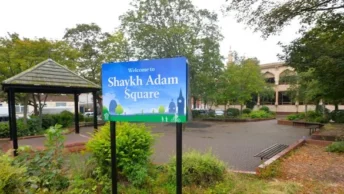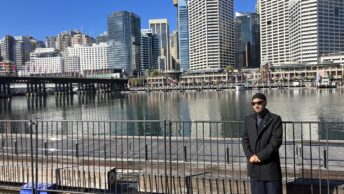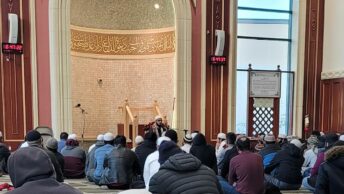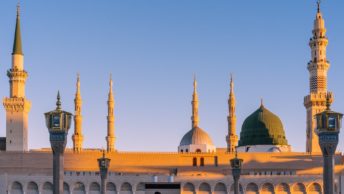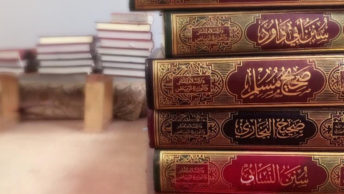(The following is a translation of a thought-provoking and rare discourse by Shaykh al-Islam Mufti Muhammad Taqi Usmani (hafizahullah), delivered on Saturday 3rd Safar 1440 AH/13th October 2018; to a group visiting Darul Uloom, Karachi, as part of the Jama’ah Tabligh – Translated by Mufti Muhammad ibn Adam).
الحمد لله نحمده ونستعينه ونستغفره ونؤمن به ونتوكل عليه، ونعوذ بالله من شرور أنفسنا ومن سيئات أعمالنا، من يهده الله فلا مضل له ومن يضلله فلا هادي له، وأشهد أن لا إله إلا الله وحده لا شريك له، وأشهد أن سيدنا ومولانا محمدا عبده ورسوله صلى الله تعالى عليه وعلى آله وأصحابه وبارك وسلم تسليما كثيرا،
أما بعد
It is the grace (fadl) and favour of Allah ta’ālā that He sent your group [as part of the jama’ah tabligh] – consisting of both men and women – to our Darul Uloom; and it is hoped from the grace of Allah that there will be much benefit in this group coming here In Sha Allah.
Allah Most High has placed unique blessing (baraka) in this effort of jama’ah tabligh. It is because of the burning desire in the heart of Shaykh Mawlānā Muhammad Ilyas (may Allah have mercy on him) – who laid the foundations for this blessed jama’ah – that we see its positive affects throughout the world.
Al-Hamdulillah, I regularly visit different counties of the world, and wherever I travel I clearly see the radiance and blessings of the jama’ah tabligh work. Recently, I visited the Balkans where there are States which remained under communist rule for seventy years – the seed of faith (dīn) had been destroyed. I also toured the same area twelve years earlier, and I had observed that although there were many people who are Muslim by name but they were unaware of even the basics of religion – even the statement (kalima/shahadatayn) was more or less not known, the concept of praying was all but lost, and they seemed unaware of the various matters of religion. At that time (12 years earlier) when I visited, one or two people had started this work in a small hut, but there was a lot of misunderstanding about jama’ah tabligh amongst the people there and thus the work was not progressing. Al-hamdulillah, I was able to talk to the Muslims there; and now when I visited after twelve years, a big tabligh centre (markaz) has been established at the same location. The work of da’wa is being carried out with dedication, and the blessed effects of it are also visible.
With the grace of Allah ta’ālā, this work is progressing gradually everywhere. The light of faith seen illuminated everywhere, a great role has been played by the jama’ah tabligh, Al-hamdulillah. [It has worked] in such remote areas and in amongst people who were far away from the religion, but with the blessing of the jama’ah tabligh Allah Most High guided them to become sincere and good believers. The teachings of the religion (dīn) is being spread, and Allah Most High with his grace made it possible to preach even in such areas where working was difficult.
Why do Tabligh Groups Travel to different Locations?
As you are all aware, groups travel regularly from one location to another. One may ask, why is there a need for a group (jama’ah) to visit Darul Uloom [in Karachi]? – Darul Uloom itself is a religious centre/institution where the work of teaching (ta’lim) and preaching (tabligh) are carried out? I’m not sure if you have a response to this question in your hearts, but I will tell you the answer.
Firstly, every believer is a mirror to another believer; when believers gather somewhere with faith and sincerity, the reflection of their good deeds falls on each other. Therefore, no one is independent – whether a scholar or not – from sitting with and staying in the company of other believers, and thus refreshing his or her faith. The Companions (may Allah be pleased with them) would say [to one another], “Let’s sit together for a moment so that we become believers.” They were already believers, and the ones they were inviting to sit with them were also believers, but the point is that when believers gather for a religious purpose, the reflection of one’s radiance and blessings falls on the other. Each person should think that the other believer is a means of my rectification; at times rectification is achieved by looking at the good actions of the other person, and sometimes faith is refreshed by way of mutually reminding one another (muzakara) and one is guided to carry out righteous deeds.
Let me relate to you something regarding my father Mawlānā Mufti Muhammad Shafi’ (may Allah elevate his rank) – he did not mention this in a public gathering, but rather within our home. He said, “Whenever I am passing somewhere and I hear a preacher preaching, I sit down to listen to his talk – at least for a short while if I don’t have much time – with the intention of gaining benefit and in the hope that Allah ta’ālā may put something in his heart and on his tongue which is of benefit to me and prompts me to act.”
Consider the fact that he is the Grand Mufti of Pakistan, well known throughout the world in terms of his vast knowledge and deep understanding (tafaqquh), and people from around the globe come to him for guidance and rectification; yet he has no qualms in pausing and listening to a regular preacher – someone who may not even be [to the level of] his grand-student – in the hope that he may say something that is beneficial for him. Therefore, the believers gathering for the purpose of discussing something of religion is in of itself a blessing (ni’ma), and guaranteed to benefit – with the condition of sincerity and seeking Allah’s pleasure.
Secondly, regarding groups travelling from one location to another; people actually object as to why they keep moving from one place to another such as from Karachi to Lahore and vice versa… [They say] why doesn’t each group just concentrate in its own area? For example, people travel from here [Pakistan] to Sudan, so why don’t the people of Sudan just make effort in their own country? Why is there a need for a group to travel from here? Why is there a need to travel to different locations?
So in relation to this, one should keep in mind an important point (and experience tells us that there is benefit in this practice). The point is that Allah Most High does not allow any effort of His Dīn to go to waste, wherever it is taking place. At times, the effort is taking place in one place but its effects are felt elsewhere. The trench is being dug in Madina al-Munawwara [during the battle of Al-Khandaq] with stones tied on stomachs [due to intense hunger] and effort is being made here, but the palaces of Kaysar and Kisra are being shown that all this will soon be under your control – effort is being made here but the effects are felt there. As such, the effort for Allah’s Dīn is such that wherever it is taking place, its effects will appear somewhere or another. Therefore, to go out (khuruj) for this purpose is – in of itself – a blessing (ni’ma) and means of benefit, the effects of which will definitely occur somewhere. And you can see the positive effects [of going out in the path of Allah] throughout the world Al-hamdulillah, hence never consider it to be futile.
The Concept behind the Six Principles/Numbers
I also wanted to highlight that the main reason behind Allah ta’ālā placing blessings (baraka) in this work of jama’ah tabligh is the sincerity (ikhlas) and deep concern of its founder Mawlānā Muhammad Ilyas (may Allah have mercy on him), which spread light (nur) throughout the world.
Secondly, the method he set up was such that in order to unite the umma he employed a principled outline in which there is no sectarian divide and politics; rather, he restricted it to the foundational laws of the Dīn. Some people even object saying things like, “they don’t work in politics?!” [These people should realise that] everyone has a specific jurisdiction, and he (Mawlānā Muhammad Ilyas) fixed a particular boundary for which to work in. He did not mean that the work carried out by others in different fields is useless; rather, he identified a particular jurisdiction and set it up as six numbers/principles. This was done so that each and every individual can be invited towards the religion and no one is left behind. As such, these six principles were made so that people can be united and gathered upon the basic and foundational teachings of Islam, and no sectarianism, politics or personal motives can become a barrier. This way, the basic realities of the Dīn will be understood by the masses.
The objective of Mawlānā Ilyas (Allah have mercy on him) was never to consider matters outside of these six numbers to not be part of the Dīn, or that the effort being made outside of these six numbers is futile, or that it is in conflict with the six numbers. Therefore, firstly, it is important to keep this reality in mind.
The reason I am mentioning this is that sometimes the basis from where a matter begins becomes hidden from the minds [i.e. the origin of the six numbers]. As such, firstly [in relation to these six numbers], I mentioned that he arranged them in order to unite the umma on the foundations of deen so that they are able to learn the basics; and also that there is no rejection of matters outside of these six numbers.
Honouring the Believer (Ikram al-Muslim)
Thereafter, secondly, by pondering deeply over these six numbers we realise that a major part of the Dīn is actually covered within them. There are certain things contained in them that we have limited with our actions, but in essence they are not limited. For example, there is a very important principle/number within these six numbers which is “honouring the believer” (ikram al-muslim). The simple and apparent meaning of honouring the believer is to respect a believer. However, what is respect, what is the manner and method of respecting, and what are its finer details? All of this is included in this principle.
As such, the guidelines of the Qur’an and Sunna that relate to the rights of Allah’s servants (huquq al-ibad) are to be all included under this principle. Allah’s Messenger (peace and blessings be upon him) said, “A believer is one from whose tongue and hands other believers are safe” (Bukhari & Muslim). This is a great teaching [of our religion] – in that one should ensure not to even slightly harm another individual, whether with the tongue, hands or actions.
On the surface, it is merely one statement of Allah’s Messenger (peace and blessings be upon him) – i.e. not to harm anyone with the tongue or hands – but if we go into its details, it is in fact a topic of an entire book; the hadith and fiqh literature is filled with its detailed rulings. The rights of mothers, fathers, brothers, sisters, husbands, wives, children and neighbours are all detailed by Allah’s Messenger (peace and blessings be upon him) by way of his verbal statements and his action. These rulings form a major and independent part of our Hadith books such as the chapters on “adab” and “al-bir wa ‘l-sila” and “mu’ashara” – all of which ae connected to the rights of Allah’s servants.
The significance of huquq al-ibad is such that if a person is negligent in regard to Allah’s rights and sins (may Allah protect us), then if he ever is granted the ability (tawfiq) by Allah to repent – whether he is an alcoholic, fornicator, or gambler – in an instance he becomes pure from the sins by way of repentance. Hakim al-Umma Shaykh Mawlānā Ashraf Ali Thanawi (may Allah have mercy on him) would say that people think it is very difficult to become a saint/friend of Allah (wali), whereas in fact it is very simple. Make a sincere repentance from all the previous sins once, and instantly one will become a wali of Allah.
However, if someone violates the rights of a servant of Allah or causes harm to him – whether with the tongue, hands or actions; and whether physically, financially, psychologically or emotionally – then he will not be forgiven by mere repentance; rather, he will have to seek forgiveness from the one he wronged and be forgiven by him. One will need to go to the one wronged; merely beseeching Allah in night prayers will not be sufficient until the one wronged does not forgive.
In a hadith, once Allah’s Messenger (peace and blessings be upon him) asked his Companions, “Do you know who the muflis (bankrupt) is?” They said, ‘The muflis among us is the one who has no dirham (wealth).’ He said, “The real muflis in my umma is the one who comes on the Day of Judgement with [an abundance of good deeds such as] prayer, fasting, zakat, [Hajj, Umra, Qur’an recitation, dhirk; all of which should’ve entered him into paradise]. He comes [but many of those whom he owed rights stand up]; he has insulted so and so, falsely accused so and so, consumed someone’s wealth, spilt someone’s blood and struck someone. [Those whose rights he has violated will demand them, and there will be no money to fulfil their rights, hence the currency to settle these rights will be good deeds]. As such, [the only way to give them their rights is that] his good deeds will be given to them. [Prayers given to one person, Zakat to another, fasts given to someone else, tilawa and dhikr given to another… to the point that] if his good deeds finish before paying off their rights, the sins of those whom he hurt will be transferred into his account. Then he will be thrown into the Fire” (Muslim).
As such, this person comes to Allah with an abundance of good deeds but ends up empty handed and the sins of others come into his account – may Allah protect us, Ameen. So the real muflis/bankrupt is one who ends up with having no capital in the hereafter; everything is taken away such as prayer, fasts, dhikr, tilawa… because of usurping the rights of others by way of slandering, backbiting, false accusations, hurting feelings, unlawfully taking someone’s wealth and so-on-and-so-forth. This shows the importance of the rights of Allah’s servants/creation (huquq al-ibad) in our religion.
Allah Most has given us such a religion that it provides detailed guidance in every sphere of life, and the rights of the creation are given great importance. The principle/number of “ikram al-muslim” [highlighted by Mawlānā Muhammad Ilyas] is, in actual fact, to highlight this reality. However, we are negligent in this regard. When we preach, the rights of Allah’s servants/creation (huquq al-ibad) prescribed by Shari’a are not emphasised enough. I am not talking specifically about the jama’ah tabligh; rather, it has become a common notion these days that Dīn is only about praying, fasting [and other devotional worships]; whilst dealings (mu’amalat), moral ethics (akhlaq) and social/communal laws (mu’ashara) are considered to be outside of Dīn. The rights of the creation ordained by Allah Most High are not considered to be part of Dīn.
The result of this is that it creates an imbalance in religiosity. In other words, we offer many prayers, observe many fasts, come out with groups for tabligh, remember Allah in abundance, recite the Qur’an excessively, but pay no heed to huquq al-ibad. It means we fill one side and leave the other side empty. What answer will we give if we violated their rights, and they demanded them on the Day of Judgment, may Allah protect us.
As such, my request and suggestion is that these six numbers/principles [in jama’ah tabligh teachings] are all regularly taught and explained Al-hamdulillah, but the principle of “ikram al-muslim” needs more expansion. It is important to have the scholars (ulama) lecture on it, so they can explain who has what rights in Shari’a, and the sinful consequences of neglecting these rights.
For example, Allah’s Messenger (peace and blessings be upon him) said, “Backbiting is more severe in sin than fornication (zina)” (Bayhaqi, Shu’ab al-Iman, with a weak chain). The reason is that if someone commits the sin of zina (may Allah protect everyone), it is forgiven with sincere repentance. However, backbiting (ghiba) is not forgiven until the one wronged does not forgive. For this reason it was the way of our elders – upon meeting and bidding farewell to someone – to say the phrase, “please forgive me for anything said or done”, meaning if I have wronged you in any way, then forgive me. This is a very good phrase which results in a comprehensive type of forgiveness. However, we need to keep our tongues under control ensuring that no words of transgression are uttered; it is important to weigh the consequences before speaking. We need to ensure not to violate any individual’s right and not to hurt anyone. We should try our best to fulfil the rights of others that Allah Most High has ordained upon us; for example the rights of parents have been much emphasised in the Qur’an, in that if one’s parents reach old-age, “do not say to them: uff (a word or expression of anger or contempt) and do not scold them, and address them with respectful words, and submit yourself before them in humility out of compassion, and say, “My Lord, be merciful to them as they have brought me up in my childhood” (Qur’an 17: 23/24).
So, when we visit parents do we give consideration to all these guidelines? Do we fulfil their rights? The Qur’an is telling us that “when they reach old age”, because in old age the senses usually decline and one is angered easily, and the things parents say or do don’t seem straightforward. Highlighting this specific stage, the Qur’an tells us not to scold them, and to address them with respect and supplicate for them.
As such, this is a very important branch of “ikram al-muslim”. The same applies to the rights of siblings, relatives and spouses. Allah’s Messenger (peace and blessings be upon him) said, “The best among you is the one who is the best to his wife, and I am the best of you to my wives” (Bukhari). When you stay in the company of someone for a very long time – such as 40, 45, 50 years – that is when you are tested in terms of how you are fulfilling rights.
Summary
In summary, Allah ta’ālā has granted blessings/baraka in coming out with the jama’ah tabligh. Traveling/visiting different places is, in itself, a means of much good and blessings In Sha Allah; and mutually reminding and discussing the matters of deen brings benefit.
However, I wanted to draw your attention to the fact that the principle of “ikram al-muslim” needs expansion, and the laws of Shari’a in relation to it should be taught with due diligence. I believe that Mawlānā Muhammad Ilyas (Allah have mercy on him) has covered a large portion of Islamic teachings in one word/expression!
In this regard, at times, immoderate behaviours become apparent; even in lectures, immoderation and imbalance becomes manifest [in that only certain aspects of religion are focused on]. This needs to be corrected, especially by those who have knowledge (ilm). It is their (people of ilm) duty to remain balanced themselves and also keep others in balance and moderation.
May Allah ta’ālā grant us all the blessings of your group’s visit to us, may He allow us to benefit from you, may He grant us also a share from the purpose of your visit, and may He instil in our hearts the reverence, love and desire for His Dīn, and increase it day-by-day. I pray Allah grant us the ability (tawfiq) to act upon all the teachings of Dīn in accordance with His pleasure – the objective should be His ‘pleasure’ (rida); the sole purpose of studying, teaching, preaching (tabligh), inviting others (da’wa), lecturing, advising, correcting others (islah) must be the pleasure of Allah Almighty. One should do that in which lies the pleasure of Allah. When a particular act, at a particular given time, is demanded by Allah and has His pleasure in it, we should do that act. The Dīn is not about doing what we fancy doing; rather, the Dīn is about obeying Allah Most High in order to seek His pleasure, regardless of whether one feels like doing something else. May Allah make us understand this concept out of His mercy, and grant us the ability to act upon it through his grace – it will a means of goodness for us in this life and the next, Ameen. And the last of our prayers is: Praise be to Allah, the Lord of the worlds.

